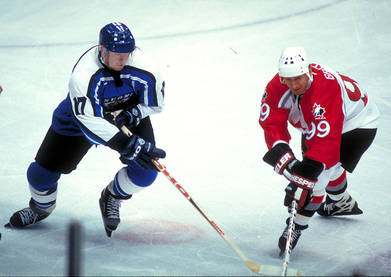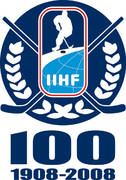

Story #7 NHL takes break and releases players for 1998 OlympicsFebruary 7-22, 1998 – Nagano, Japan
There were two key events which led to the almost full participation of NHL players at the 1998 Olympics in Nagano, Japan. The first was the NHL lockout that cost fans most of the 1994-95 season. Out of this lockout came a new Collective Bargaining Agreement, and among the agreed-upon paragraphs in the new CBA was a commitment by both the players and the league to shut down NHL operations for long enough to ensure worldwide promotion of the North American game during the Nagano Games.  Again, there was agreement and compromise. The NHL went so far as to shut down for 17 days, and the IIHF re-jigged the playing format to allow for the top teams to overcome their travel fatigue without jeopardizing their chances of winning. Some 14 countries took part in Nagano, but the tournament was held in two distinct stages. The first was a qualifying stage among the lower eight countries which played a round robin within two groups of four teams. The top team from each group advanced to the next round, the round NHLers started to play. About the Top 100 StoriesAs part of the IIHF's 100th anniversary celebrations, www.IIHF.com is featuring the 100 top international hockey stories from the past century (1908-2008). Starting now and continuing through the 2008 IIHF World Championships in Canada, we will bring you approximately three stories a week counting down from Number 100 to Number 11.
The Final Top 10 Countdown will be one of the highlights of the IIHF's Centennial Gala Evening in Quebec City on May 17, the day prior to the Gold Medal Game of the 2008 World Championship.
These are the criteria for inclusion on this list: First, the story has to have had a considerable influence on international hockey. Second, it has to have had either a major immediate impact or a long-lasting significance on the game. Third, although it doesn't necessarily have to be about top players, the story does have to pertain to the highest level of play, notably Olympics, World Championships, and the like. The story can be about a single moment — a goal, a great save, a referee's call — or about an historic event of longer duration — a game, series, tournament, or rule change. |
 Click here for the 100 Top Stories
|
|






